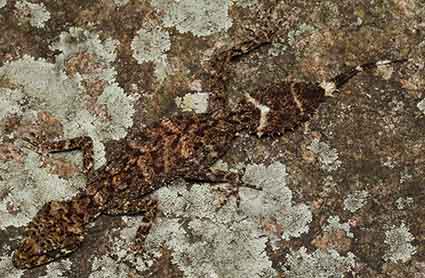Abstract
A recent targeted reptile survey of Scawfell Island, in the South Cumberland Group, revealed a species of Phyllurus gecko that could not be morphologically assigned to any described species. Here I describe this as a new species, Phyllurus fimbriatus sp. nov., based on differences in a number of morphometric and scalation traits from congeners. Phyllurus fimbriatus sp. nov. is restricted to deeply-piled boulder habitat under rainforest canopy on Scawfell Island, approximately 50 km offshore from Mackay in mid-east Queensland. A survey in rocky, rainforest habitat on nearby Carlisle Island failed to find the species, and other nearby islands appear to lack sufficiently deep rock outcropping to support the species. Phyllurus fimbriatus sp. nov. is known from two small patches of habitat on Scawfell Island, but it is common within these, and is likely to be found in other suitable habitat patches on the island. Based on assessment of imagery, the total area of habitat occupied may be < 1 km2. The island is protected within South Cumberland National Park, but fire encroachment from adjacent dry sclerophyll habitats, climate change, competition from introduced Asian House Geckos (Hemidactylus frenatus Duméril & Bibron, 1836), and poaching are potential threats.
References
Barnett, L.K., Phillips, B.L. & Hoskin, C.J. (2017) Going feral: Time and propagule pressure determine range expansion of Asian house geckos into natural environments. Austral Ecology, 42, 165–175. https://doi.org/10.1111/aec.12416
Barnett, L.K., Phillips, B.L., Heath, A.C.G., Coates, A. & Hoskin, C.J. (2018) The impact of parasites during range expansion of an invasive gecko. Parasitology, 145, 1400–1409. https://doi.org/10.1017/S003118201800015X
Bauer, A.M. (1990) Phylogenetic systematics and biogeography of the Carphodactylini (Reptilia: Gekkonidae). Bonner Zoologische Monographien, 30, 1–217.
Bertola, L.V., Higgie, M. & Hoskin, C.J. (2018) Resolving distribution and population fragmentation in two leaf-tailed gecko species of north-east Australia: key steps in the conservation of microendemic species. Australian Journal of Zoology, 66, 152–166. https://doi.org/10.1071/ZO18036
Cole, N.C., Jones, C.G, & Harris, S. (2005) The need for enemy-free space: the impact of an invasive gecko on island endemics. Biological Conservation, 125, 467–474. https://doi:10.1016/j.biocon.2005.04.017
Couper, P.J., Covacevich, J.A. & Moritz, C. (1993) A review of the leaf-tailed geckos endemic to eastern Australia: a new genus, four new species, and other new data. Memoirs of the Queensland Museum, 34, 95–124.
Couper, P.J., Hamley, B. & Hoskin, C.J. (2008) A new species of Phyllurus (Lacertilia: Gekkonidae) from the Kilkivan district of south-eastern Queensland. Memoirs of the Queensland Museum, 52, 139–147.
Couper, P.J. & Hoskin, C.J. (2008) Litho-refugia: the importance of rock landscapes for the long-term persistence of Australian rainforest fauna. Australian Zoologist, 34, 554–560. https://doi.org/10.7882/AZ.2008.032
Couper, P. & Hoskin, C.J. (2013) Two new subspecies of the leaf-tailed gecko Phyllurus ossa (Lacertilia: Carphodactylidae) from mid-eastern Queensland, Australia. Zootaxa, 3664 (4), 537–553. https://doi.org/10.11646/zootaxa.3664.4.7
Couper, P.J., Schneider, C.J., Hoskin, C.J. & Covacevich, J.A. (2000) Australian leaf-tailed geckos: phylogeny, a new genus, two new species and other new data. Memoirs of the Queensland Museum, 45, 253–265.
Covacevich, J. (1975) A review of the genus Phyllurus (Lacertilia: Gekkonidae). Memoirs of the Queensland Museum, 17, 293–303.
Duméril, A.M.C. & Bibron, G. (1836) Erpétologie Genérale ou Histoire Naturelle Complète des Reptiles. Vol. 3. Librarie Enclyclopedique de Roret, Paris, 528 pp.
Gray, J.E. (1845) Catalogue of the Specimens of Lizards in the Collection of the British Museum. British Museum, London, xxviii + 289 pp.
Hines, H.B. & Leggett, R. (1996) Herpetofauna of Scawfell Island, with a review of museum specimens from the Cumberland Group of islands. The Queensland Naturalist, 34, 1–8.
Hoskin, C.J. (2011) The invasion and potential impact of the Asian House Gecko (Hemidactylus frenatus) in Australia. Austral Ecology, 36, 240–251. https://doi.org/10.1111/j.1442-9993.2010.02143.x
Hoskin, C.J., Bertola, L.V. & Higgie, M. (2019) A new species of Phyllurus (Lacertilia: Carphodactylidae) from the Pinnacles, north-east Australia. Zootaxa, 4576 (1), 127–139. https://doi.org/10.11646/zootaxa.4576.1.6
Hoskin, C.J., Couper, P.J., Schneider, C.J. & Covacevich, J.A. (2000) s.n. In: Couper et al. (2000), Australian leaf-tailed geckos: phylogeny, a new genus, two new species and other new data. Memoirs of the Queensland Museum, 45, pp. 255–258
Hoskin, C.J., Couper, P.J. & Schneider, C.J. (2003) A new species of Phyllurus (Lacertilia: Gekkonidae) and a revised phylogeny and key for the Australian Leaf-tailed geckos. Australian Journal of Zoology, 51, 153–164. https://doi.org/10.1071/ZO02072
Hoskin, C.J. & Couper, P.J. (2013) A spectacular new leaf-tailed gecko (Carphodactylidae: Saltuarius) from the Melville Range, north-east Australia. Zootaxa, 3717 (4), 543–558. https://doi.org/10.11646/zootaxa.3717.4.6
Leggett, R. (1988) Reptiles of Carlisle Island, December 1986. The Queensland Naturalist, 29, 13–14.
Schneider, C.J., Couper, P.J., Hoskin, C.J. & Covacevich, J.A. (2000) pp. 258–262 in Couper et al. (2000). Australian leaf-tailed geckos: phylogeny, a new genus, two new species and other new data. Memoirs of the Queensland Museum, 45, 253–265.
Skipwith, P.L., Bi, K. & Oliver, P.M. (2019) Relicts and radiations: Phylogenomics of an Australasian lizard clade with east Gondwanan origins (Gekkota: Diplodactyloidea). Molecular Phylogenetics and Evolution Biology, 140, 106589. https://doi.org/10.1016/j.ympev.2019.106589
White, J. (1790) Journal of a Voyage to New South Wales. Debrett, London, 299 pp.


